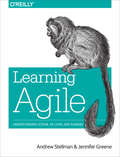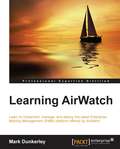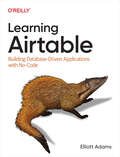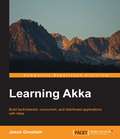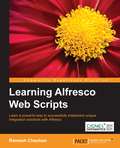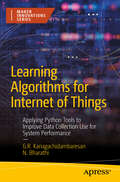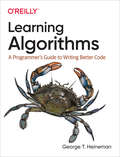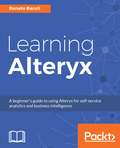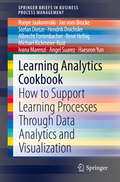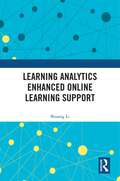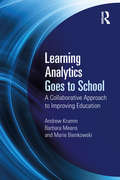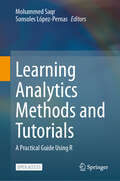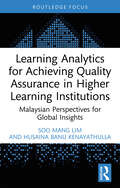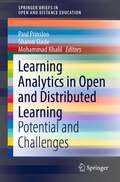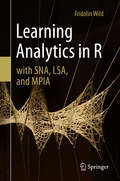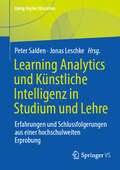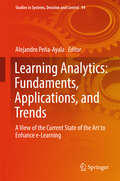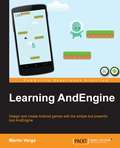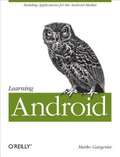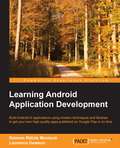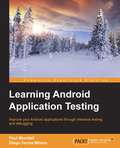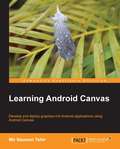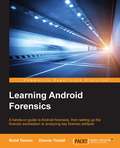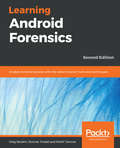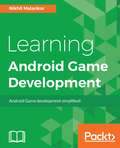- Table View
- List View
Learning Agile: Understanding Scrum, XP, Lean, and Kanban
by Jennifer Greene Andrew StellmanLearning Agile is a comprehensive guide to the most popular agile methods, written in a light and engaging style that makes it easy for you to learn. Agile has revolutionized the way teams approach software development, but with dozens of agile methodologies to choose from, the decision to "go agile" can be tricky. This practical book helps you sort it out, first by grounding you in agile’s underlying principles, then by describing four specific—and well-used—agile methods: Scrum, extreme programming (XP), Lean, and Kanban.Each method focuses on a different area of development, but they all aim to change your team’s mindset—from individuals who simply follow a plan to a cohesive group that makes decisions together. Whether you’re considering agile for the first time, or trying it again, you’ll learn how to choose a method that best fits your team and your company.Understand the purpose behind agile’s core values and principlesLearn Scrum’s emphasis on project management, self-organization, and collective commitmentFocus on software design and architecture with XP practices such as test-first and pair programmingUse Lean thinking to empower your team, eliminate waste, and deliver software fastLearn how Kanban’s practices help you deliver great software by managing flowAdopt agile practices and principles with an agile coach
Learning AirWatch
by Mark DunkerleyIf you are a technical professional who wants to dive deeper into the functionality offered by AirWatch or manage the solution, then this book will help you choose the best set of configuration, device management, and monitoring options that you can use to effectively manage your EMM implementation.
Learning Airtable: Building Database-Driven Applications with No-Code
by Elliott AdamsGet a concise yet comprehensive overview of Airtable, one of the most versatile platforms to emerge from the no-code movement. Whether you're planning a new project, sharing data analysis within your organization, tracking a detailed initiative among stakeholders, or dealing with any other project that requires well-structured collaboration, this practical book shows you how Airtable is an accessible tool to tackle these challenges.Author Elliott Adams guides you through the process of structuring your data in a relational database, creating automations based on changes to data in Airtable, and building user-friendly interfaces for no-code applications. This showcases how Airtable is superior to the typical options of either non-developers using spreadsheets or making large investments in time-consuming application development.With this book, you will:Learn how Airtable can reduce the need for custom-built applicationsUse Airtable to replace internal tools such as spreadsheetsBuild applications utilizing relational data--without any knowledge of software programmingEvaluate whether you can build a solution on Airtable rather than purchasing softwareUnderstand the limitations of the Airtable platform when compared with writing a software application from scratch
Learning Akka
by Jason GoodwinBuild fault tolerant concurrent and distributed applications with Akka About This Book * Build networked applications that self-heal * Scale out your applications to handle more traffic faster * An easy-to-follow guide with a number of examples to ensure you get the best start with Akka Who This Book Is For This book is intended for beginner to intermediate Java or Scala developers who want to build applications to serve the high-scale user demands in computing today. If you need your applications to handle the ever-growing user bases and datasets with high performance demands, then this book is for you. Learning Akka will let you do more for your users with less code and less complexity, by building and scaling your networked applications with ease. What You Will Learn * Use Akka to overcome the challenges of concurrent programming * Resolve the issues faced in distributed computing with the help of Akka * Scale applications to serve a high number of concurrent users * Make your system fault-tolerant with self-healing applications * Provide a timely response to users with easy concurrency * Reduce hardware costs by building more efficient multi-user applications * Maximise network efficiency by scaling it In Detail Software today has to work with more data, more users, more cores, and more servers than ever. Akka is a distributed computing toolkit that enables developers to build correct concurrent and distributed applications using Java and Scala with ease, applications that scale across servers and respond to failure by self-healing. As well as simplifying development, Akka enables multiple concurrency development patterns with particular support and architecture derived from Erlang's concept of actors (lightweight concurrent entities). Akka is written in Scala, which has become the programming language of choice for development on the Akka platform. Learning Akka aims to be a comprehensive walkthrough of Akka. This book will take you on a journey through all the concepts of Akka that you need in order to get started with concurrent and distributed applications and even build your own. Beginning with the concept of Actors, the book will take you through concurrency in Akka. Moving on to networked applications, this book will explain the common pitfalls in these difficult problem areas while teaching you how to use Akka to overcome these problems with ease. The book is an easy to follow example-based guide that will strengthen your basic knowledge of Akka and aid you in applying the same to real-world scenarios. Style and approach An easy-to-follow, example-based guide that will take you through building several networked-applications that work together while you are learning concurrent and distributed computing concepts. Each topic is explained while showing you how to design with Akka and how it is used to overcome common problems in applications. By showing Akka in context to the problems, it will help you understand what the common problems are in distributed applications and how to overcome them.
Learning Alfresco Web Scripts
by Ramesh ChauhanIf you are an Alfresco developer who has no experience with web scripts and you want to start developing Alfresco web scripts, then this book is definitely for you.
Learning Algorithms for Internet of Things: Applying Python Tools to Improve Data Collection Use for System Performance (Maker Innovations Series)
by G.R. Kanagachidambaresan N. BharathiThe advent of Internet of Things (IoT) has paved the way for sensing the environment and smartly responding. This can be further improved by enabling intelligence to the system with the support of machine learning and deep learning techniques. This book describes learning algorithms that can be applied to IoT-based, real-time applications and improve the utilization of data collected and the overall performance of the system. Many societal challenges and problems can be resolved using a better amalgamation of IoT and learning algorithms. “Smartness” is the buzzword that is realized only with the help of learning algorithms. In addition, it supports researchers with code snippets that focus on the implementation and performance of learning algorithms on IoT based applications such as healthcare, agriculture, transportation, etc. These snippets include Python packages such as Scipy, Scikit-learn, Theano, TensorFlow, Keras, PyTorch, and more. Learning Algorithms for Internet of Things provides you with an easier way to understand the purpose and application of learning algorithms on IoT. What you’ll Learn Supervised algorithms such as Regression and Classification. Unsupervised algorithms, like K-means clustering, KNN, hierarchical clustering, principal component analysis, and more. Artificial neural networks for IoT (architecture, feedback, feed-forward, unsupervised). Convolutional neural networks for IoT (general, LeNet, AlexNet, VGGNet, GoogLeNet, etc.). Optimization methods, such as gradient descent, stochastic gradient descent, Adagrad, AdaDelta, and IoT optimization. Who This Book Is For Students interested in learning algorithms and their implementations, as well as researchers in IoT looking to extend their work with learning algorithms
Learning Algorithms: A Programmer's Guide to Writing Better Code
by George HeinemanWhen it comes to writing efficient code, every software professional needs to have an effective working knowledge of algorithms. In this practical book, author George Heineman (Algorithms in a Nutshell) provides concise and informative descriptions of key algorithms that improve coding. Software developers, testers, and maintainers will discover how algorithms solve computational problems creatively.Each chapter builds on earlier chapters through eye-catching visuals and a steady rollout of essential concepts, including an algorithm analysis to classify the performance of every algorithm presented in the book. At the end of each chapter, you'll get to apply what you've learned to a novel challenge problem -- simulating the experience you might find in a technical code interview.With this book, you will:Examine fundamental algorithms central to computer science and software engineeringLearn common strategies for efficient problem solving -- such as divide and conquer, dynamic programming, and greedy approachesAnalyze code to evaluate time complexity using big O notationUse existing Python libraries and data structures to solve problems using algorithmsUnderstand the main steps of important algorithms
Learning Alteryx: A beginner's guide to using Alteryx for self-service analytics and business intelligence
by Alok Khobragade Mayur Ravindra Narkhede Renato BarutiKey Features Experience the power of codeless analytics using Alteryx, a leading Business Intelligence tool Uncover hidden trends and valuable insights from your data across different sources and make accurate predictions Includes real-world examples to put your understanding of the features in Alteryx to practical use Book Description Alteryx, as a leading data blending and advanced data analytics platform, has taken self-service data analytics to the next level. Companies worldwide often find themselves struggling to prepare and blend massive datasets that are time-consuming for analysts. Alteryx solves these problems with a repeatable workflow designed to quickly clean, prepare, blend, and join your data in a seamless manner. This book will set you on a self-service data analytics journey that will help you create efficient workflows using Alteryx, without any coding involved. It will empower you and your organization to take well-informed decisions with the help of deeper business insights from the data.Starting with the fundamentals of using Alteryx such as data preparation and blending, you will delve into the more advanced concepts such as performing predictive analytics. You will also learn how to use Alteryx’s features to share the insights gained with the relevant decision makers. To ensure consistency, we will be using data from the Healthcare domain throughout this book. The knowledge you gain from this book will guide you to solve real-life problems related to Business Intelligence confidently. Whether you are a novice with Alteryx or an experienced data analyst keen to explore Alteryx’s self-service analytics features, this book will be the perfect companion for you. What you will learn Create efficient workflows with Alteryx to answer complex business questions Learn how to speed up the cleansing, data preparing, and shaping process Blend and join data into a single dataset for self-service analysis Write advanced expressions in Alteryx leading to an optimal workflow for efficient processing of huge data Develop high-quality, data-driven reports to improve consistency in reporting and analysis Explore the flexibility of macros by automating analytic processes Apply predictive analytics from spatial, demographic, and behavioral analysis and quickly publish, schedule Share your workflows and insights with relevant stakeholders
Learning Analytics Cookbook: How to Support Learning Processes Through Data Analytics and Visualization (SpringerBriefs in Business Process Management)
by Hendrik Drachsler Michael Kickmeier-Rust Stefan Dietze Ivana Marenzi Jan vom Brocke Roope Jaakonmäki Albrecht Fortenbacher René Helbig Angel Suarez Haeseon YunThis book offers an introduction and hands-on examples that demonstrate how Learning Analytics (LA) can be used to enhance digital learning, teaching and training at various levels. While the majority of existing literature on the subject focuses on its application at large corporations, this book develops and showcases approaches that bring LA closer to smaller organizations, and to educational institutions that lack sufficient resources to implement a full-fledged LA infrastructure. In closing, the book introduces a set of software tools for data analytics and visualization, and explains how they can be employed in several LA scenarios.
Learning Analytics Enhanced Online Learning Support
by Shuang LiOffering the latest developments in online education in the era of big data, this book explores theories, technologies, and practices in the field of data-driven online learning support services using learning analytics. This book is divided into five chapters. Chapter 1 reflects and reconstructs the connotation of learning support against the backdrop of education reform, the rise of learning analytics, and the upgrading of the demand for learning services in the new era. Chapter 2 presents a P-K-DSE-E model of online learner characteristics and discusses measurement and data representation methods for learner characteristics based on it. Chapters 3–5 focus on the three types of learning support that are closely related to learning performance and satisfaction, including the promotion of social learning, electronic learning assessment based on the learning process, and personalized tutoring and support. This book innovatively develops the concept, theory, and practical methods of student support services in distance education traditional practices in the new era and provides valuable exploration of data-driven personalized learning service methods and technologies in the era of artificial intelligence through rich examples. This book will be essential reading for students and scholars of distance and online education, educational technology, and audiovisual education.
Learning Analytics Goes to School: A Collaborative Approach to Improving Education
by Andrew Krumm Barbara Means Marie BienkowskiLearning Analytics Goes to School presents a framework for engaging in education research and improving education practice through the use of newly available data sources and analytical approaches. The application of data-intensive research techniques to understanding and improving learning environments has been growing at a rapid pace. In this book, three leading researchers convey lessons from their own experiences—and the current state of the art in educational data mining and learning analytics more generally—by providing an explicit set of tools and processes for engaging in collaborative data-intensive improvement.
Learning Analytics Methods and Tutorials: A Practical Guide Using R
by Sonsoles López-Pernas Mohammed SaqrThis open access comprehensive methodological book offers a much-needed answer to the lack of resources and methodological guidance in learning analytics, which has been a problem ever since the field started. The book covers all important quantitative topics in education at large as well as the latest in learning analytics and education data mining. The book also goes deeper into advanced methods that are at the forefront of novel methodological innovations. Authors of the book include world-renowned learning analytics researchers, R package developers, and methodological experts from diverse fields offering an unprecedented interdisciplinary reference on novel topics that is hard to find elsewhere.The book starts with the basics of R as a programming language, the basics of data cleaning, data manipulation, statistics, and analytics. In doing so, the book is suitable for newcomers as they can find an easy entry to the field, as well as being comprehensive of all the major methodologies. For every method, the corresponding chapter starts with the basics, explains the main concepts, and reviews examples from the literature. Every chapter has a detailed explanation of the essential techniques and basic functions combined with code and a full tutorial of the analysis with open-access real-life data. A total of 22 chapters are included in the book covering a wide range of methods such as predictive learning analytics, network analysis, temporal networks, epistemic networks, sequence analysis, process mining, factor analysis, structural topic modeling, clustering, longitudinal analysis, and Markov models. What is really unique about the book is that researchers can perform the most advanced analysis with the included code using the step-by-step tutorial and the included data without the need for any extra resources.This is an open access book.
Learning Analytics for Achieving Quality Assurance in Higher Learning Institutions: Malaysian Perspectives for Global Insights (Routledge Research in Higher Education)
by Soo Mang Lim Husaina Banu KenayathullaThis book explores Learning Analytics (LA) programmes and practices in Malaysia as well as looking at the underlying forces, dilemmas and policy challenges for quality assurance in higher education institutions (HEIs). This chapters provide a comprehensive discussion of trends in academic quality assurance in higher education. It articulates a combination of theoretical issues and empirical analysis and offers a comprehensive guide to stakeholders in Management and Faculty on LA implementation in HEIs where the model in this book can be used to pave the way for a successful LA initiative. Learning Analytics is an emerging multidisciplinary technological practice with the ultimate goal of producing effective learning to improve students’ achievement in the tertiary level. The Learning Analytics model of Quality Assurance in this book is an essential guide for any faculty or manager in higher education, or researchers in higher education and learning analytics.
Learning Analytics in Open and Distributed Learning: Potential and Challenges (SpringerBriefs in Education)
by Paul Prinsloo Sharon Slade Mohammad KhalilThis book explores and further expands on the rich history of theoretical and empirical research in open and distributed learning, and addresses the impact of the “data revolution” and the emergence of learning analytics on this increasingly diverse form of educational delivery. Following an introductory chapter that maps the book’s conceptual rationale, the book discusses the potential, challenges and practices of learning analytics in various open and distributed contexts. A concluding chapter briefly summarises the chapters before providing a tentative future research agenda for learning analytics in open and distributed environments.
Learning Analytics in R with SNA, LSA, and MPIA
by Fridolin WildThis book introduces Meaningful Purposive Interaction Analysis (MPIA) theory, which combines social network analysis (SNA) with latent semantic analysis (LSA) to help create and analyse a meaningful learning landscape from the digital traces left by a learning community in the co-construction of knowledge. The hybrid algorithm is implemented in the statistical programming language and environment R, introducing packages which capture - through matrix algebra - elements of learners' work with more knowledgeable others and resourceful content artefacts. The book provides comprehensive package-by-package application examples, and code samples that guide the reader through the MPIA model to show how the MPIA landscape can be constructed and the learner's journey mapped and analysed. This building block application will allow the reader to progress to using and building analytics to guide students and support decision-making in learning.
Learning Analytics und Künstliche Intelligenz in Studium und Lehre: Erfahrungen und Schlussfolgerungen aus einer hochschulweiten Erprobung (Doing Higher Education)
by Peter Salden Jonas LeschkeIn dem Sammelband werden die Ergebnisse aus dem Projekt „KI:edu.nrw - Didaktik, Ethik und Technik von Learning Analytics und KI in der Hochschulbildung“ im Zeitraum 2020-2023 vorgestellt. Ziel des Projekts war es, sowohl an der im Schwerpunkt geförderten Ruhr-Universität Bochum als auch an der partnerschaftlich verbundenen RWTH Aachen exemplarisch zu erarbeiten, wie Regeln, Konzepte, Prozesse und Technik für den Einsatz von Learning Analytics und KI in Studium und Lehre ausgestaltet werden können. Die Besonderheit: Alle lehrbezogenen Akteurinnen und Akteure wurden in einem umfassenden Ansatz einbezogen, um zu verstehen, wie Hochschulen sich als Gesamtorganisationen auf die kommenden Herausforderungen in diesem Bereich einstellen müssen. Der Band zeigt damit Wege in eine zukünftige Hochschulwelt, die nicht mehr in allzu weiter Ferne liegt.
Learning Analytics: Fundaments, Applications, and Trends
by Alejandro Peña-AyalaThis book provides a conceptual and empirical perspective on learning analytics, its goal being to disseminate the core concepts, research, and outcomes of this emergent field. Divided into nine chapters, it offers reviews oriented on selected topics, recent advances, and innovative applications. It presents the broad learning analytics landscape and in-depth studies on higher education, adaptive assessment, teaching and learning. In addition, it discusses valuable approaches to coping with personalization and huge data, as well as conceptual topics and specialized applications that have shaped the current state of the art. By identifying fundamentals, highlighting applications, and pointing out current trends, the book offers an essential overview of learning analytics to enhance learning achievement in diverse educational settings. As such, it represents a valuable resource for researchers, practitioners, and students interested in updating their knowledge and finding inspirations for their future work.
Learning AndEngine
by Martin VargaIf you are a beginner to AndEngine, or mobile game development in general, and you are looking for a simple way to start making games for Android, this book is for you. You should already know the basics of Java programming, but no previous game development experience is required.
Learning Android
by Marko GargentaWant to build apps for Android devices? This book is the perfect way to master the fundamentals. Written by an expert who's taught this mobile platform to hundreds of developers in large organizations, this gentle introduction shows experienced object-oriented programmers how to use Android's basic building blocks to create user interfaces, store data, connect to the network, and more. You'll build a Twitter-like application throughout the course of this book, adding new features with each chapter. Along the way, you'll also create your own toolbox of code patterns to help you program any type of Android application with ease. Get an overview of the Android platform and discover how it fits into the mobile ecosystem Learn about the Android stack, including its application framework, and the structure and distribution of application packages (APK) Set up your Android development environment and get started with simple programs Use Android's building blocks--Activities, Intents, Services, Content Providers, and Broadcast Receivers Learn how to build basic Android user interfaces and organize UI elements in Views and Layouts Build a service that uses a background process to update data in your application Get an introduction to Android Interface Definition Language (AIDL) and the Native Development Kit (NDK)
Learning Android Application Development
by Laurence Dawson Raimon Rafols MontaneBuild Android N applications using modern techniques and libraries to get your own high-quality apps published on Google Play in no time About This Book * Get started with Android development, from the installation of required tools to publishing to the market * Make your applications Android N ready--Android has evolved quite a lot since the very beginning and so has their Software Development Kit--so get up to speed * Save time and improve the quality of your applications with widely used open source libraries and dependency management Who This Book Is For Want to get started with Android development? Start here. What You Will Learn * Get to know how to use popular open source libraries to reduce time to market and avoid re-inventing the wheel * Automate your application's testing phase to avoid last minute crashes * Use dependency management to properly keep dependencies and updates under control * Efficiently show huge amounts of items in a list * Forget about memory and speed concerns * Publish and monetize your Android applications on Google Play * Persist your application data so it can continue working in offline mode * Don't let the UX break because of network issues In Detail The mobile app market is huge. But where do you start? And how you can deliver something that takes Google Play by storm? This guide is the perfect route into Android app development - while it's easy for new apps to sink without a trace, we'll give you the best chance of success with practical and actionable guidance that will unlock your creativity and help you put the principles of Android development into practice. From the fundamentals and getting your project started to publishing your app to a huge market of potential customers, follow this guide to become a confident, creative and reliable mobile developer. Get to grips with new components in Android 7 such as RecyclerView, and find out how to take advantage of automated testing, and, of course, much, much more. What are you waiting for? There's never been a better time - or a better way - to get into Android app development. Style and approach More than just a manual, this is an accessible route into Android development. Packed with examples that demonstrate how to put key concepts and ideas into practice, this guide isn't just about learning, it's about immediate development.
Learning Android Application Testing
by Diego Torres Milano Paul BlundellIf you are an Android developer looking to test your applications or optimize your application development process, then this book is for you. No previous experience in application testing is required.
Learning Android Canvas
by Mir Nauman TahirThis book is a fast-paced, practical, step-by-step tutorial guide full of examples that are easy to follow and implement.This book is a great resource for developers who have basic Android development knowledge and want to work on graphics-rich applications and games but are totally new to working with graphics and Android Canvas.
Learning Android Forensics
by Rohit Tamma Donnie TindallIf you are a forensic analyst or an information security professional wanting to develop your knowledge of Android forensics, then this is the book for you. Some basic knowledge of the Android mobile platform is expected.
Learning Android Forensics - Second Edition: Analyze Android devices with the latest forensic tools and techniques, 2nd Edition
by Rohit Tamma Donnie Tindall Oleg SkulkinIf you are a forensic analyst or an information security professional wanting to develop your knowledge of Android forensics, then this is the book for you. Some basic knowledge of the Android mobile platform is expected.
Learning Android Game Development
by Nikhil MalankarLearn the art of making Android games and turn your game development dreams into reality About This Book • Leverage the latest features of Android N to create real-world 2D games • Architect a 2D game from scratch and level up your Android game development skill • Transition from developing simple 2D games to 3D games using basic Java code Who This Book Is For If you are a mobile developer who has basic Java programming knowledge, then this book is ideal for you. Previous Android development experience is not needed; however, basic mobile development knowledge is essential. What You Will Learn • Understand the nuts and bolts of developing highly interactive and interesting games for Android N • Link the interface to the code used in games through simple methods • Interact with the images on the screen and also learn to animate them • Set and save the game state and save high scores, hit points, and so on for your games • Get a grasp of various collision techniques and implement the bounding box technique • Convert your 2D games to 3D games using Android N • Get an understanding of the process of UI creation using Android Studio In Detail In this book, we'll start with installing Android studio and its components, and setting it up ready for Android N. We teach you how to take inputs from users, create images and interact with them, and work with sprites to create animations. You'll then explore the various collision detection methods and use sprites to create an explosion. Moving on, you'll go through the process of UI creation and see how to create buttons as well as display the score and other parameters on screen. By the end of the book, you will have a working example and an understanding of a 2D platform game like Super Mario and know how to convert your 2D games to 3D games. Style and approach This easy-to-understand guide follows a step-by-step approach to building games, and contains plenty of graphical examples for you to follow and grasp quickly, giving you the chance to implement the concepts practically.
